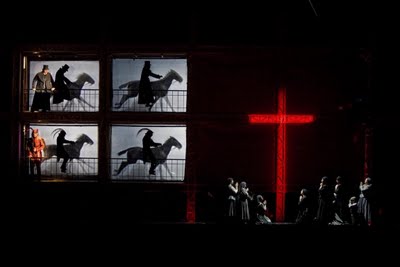I came to the New Works Forum conference as a composer, as a producer of my
own works, and as someone who is just beginning to help others get their works
done. I didn’t know what to expect, but was very pleasantly surprised. I
suppose it makes sense that those that come to a New Works Forum are those who
are interested in new works, but the level of excitement, the feeling that this
is the future, the search for new solutions to funding and production and
presentation and development of new opera was striking, as well as everyone’s
interest in the wide range of what is going on.
The conference was held at the same time as the Prototype festival, which was great. I had time to see a few things: Paul's Case, which was quite delicate and sublime, Thumbprint, which captured the culture in which it took place and had some very nice chamber writing, and my favorite piece of the festival, Angel's Bone, which is one of those few pieces where the text is so strong that it can stand on its own but where the text and the intensely gorgeous music combined with it to produce something incredible. Let me quote a bit from Royce Vavrek's libretto:
Brick J. can't get enough;
Mounts me, holding me
by my empty wings.
Sucks every drop
Of my inner-most marrow
Moans as he rolls
My tissue on his tongue:
A carnivorous act.
I was somewhat aware of the pain felt by the larger opera
companies, but it was illuminating to hear it directly from them. One can see
how they worked themselves into a situation that is very difficult to get out
of – a funding structure that is based on very large productions of traditional
repertoire – where it is hard to make a move in any direction without losing
something. When David Devan talked about the costs of producing, even in his
small hall, it’s clear that nimbleness for him is difficult to achieve.
I did see that some of the aesthetic choices of the big
companies (although not all) were towards more conservative works. And maybe
saying they are “conservative” is a lazy choice of words – more that some of
the works presented in the forum were very play-like, or even
musical-theater-like, with lots of dialog, with even a certain cuteness of the
dialog. I wondered if this was because it is believed that this is what will
align with the tastes of their current audience. I shared a long taxi ride with
Ben Krywosz (Nautilus Music Theater) and he stated my concern very succinctly: why are we singing? It’s a really good question and worth looking
at for new works. I do think opera is a very different medium than plays or
musical theater, that there’s a certain depth that is possible because of the
richness and development of the music over a single work – that it can be an
equal partner in the drama, adding another line of emotion and character and
narrative development, not just as underscoring or underlining the text. I
liked when someone at the conference said that singing is unnatural, so why
try to be natural? Yes, right.
There were also some very good discussions about a growing
awareness of the audience’s tastes and about developing pieces that do make a
connection, and statements that younger composers seemed aware that we have to
do things that connect to an audience for the art form to survive. But I do
worry that this seems to be taken by some to imply a retrenchment or a – dare I
say it again – conservatism. I believe
that there do have to be some uncompromising artists that push the form
forward. Those don’t necessarily have to have 1.8 million dollar productions,
but a piece that was mentioned a few times at the conference – Einstein on the
Beach – is way outside of the style – or even the meta-style – the approach –
of pieces people were talking about producing. It’s a perfect example of something
I talked about above – a piece that could not be a play or a movie – a piece
that relied on the power of its music. I know many composers and artists and
directors who were inspired and brought into the then dusty world of opera
because of that work, which was so striking and so different and so compelling.
I’m one of those people. We tend to forget that Opera itself was a product of
the Florentine renaissance, that the concept of a richly sung line over an rich
accompaniment was an artistic revolution that displaced the sung monody of the
church. It’s good to be reminded that one should not be afraid.






